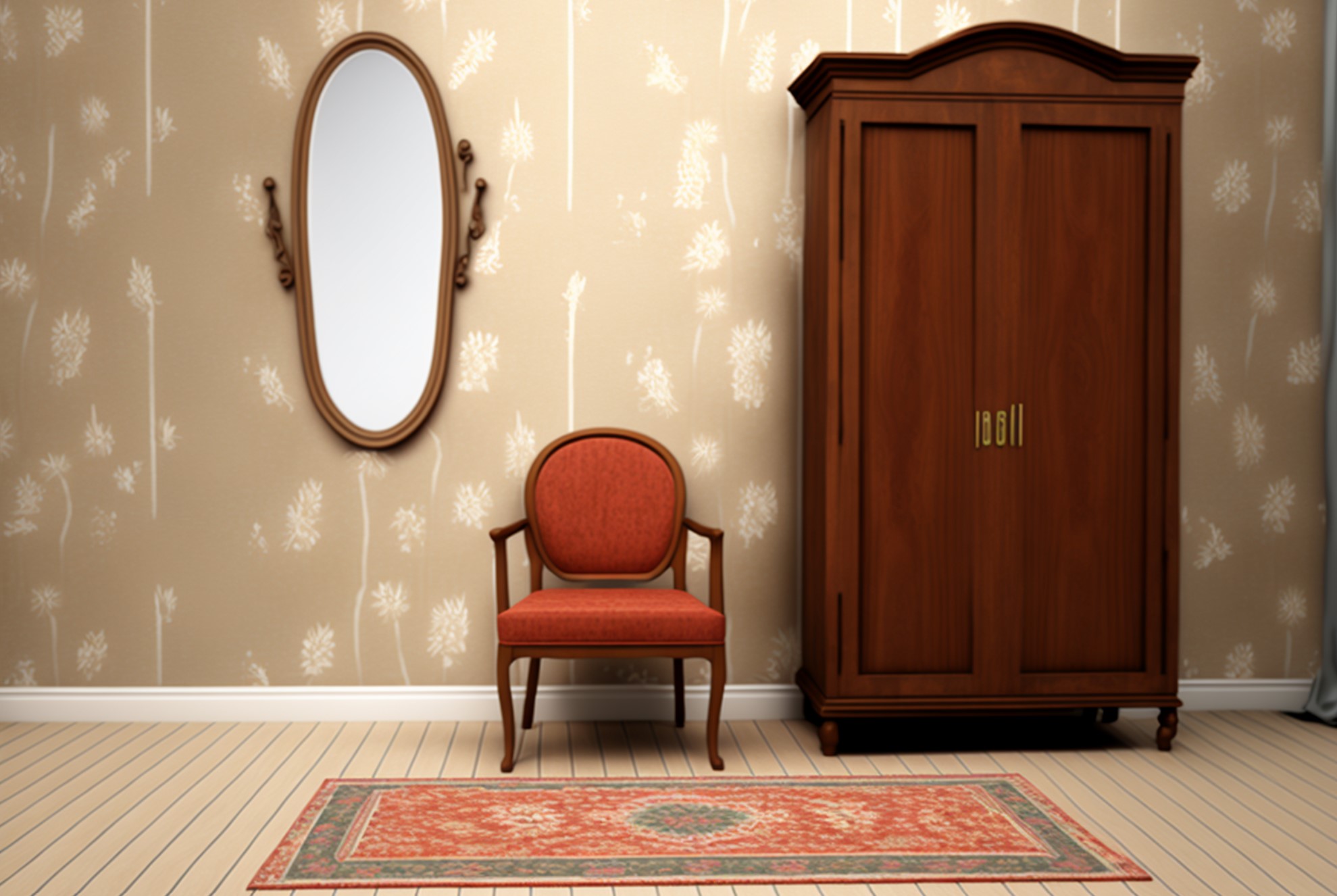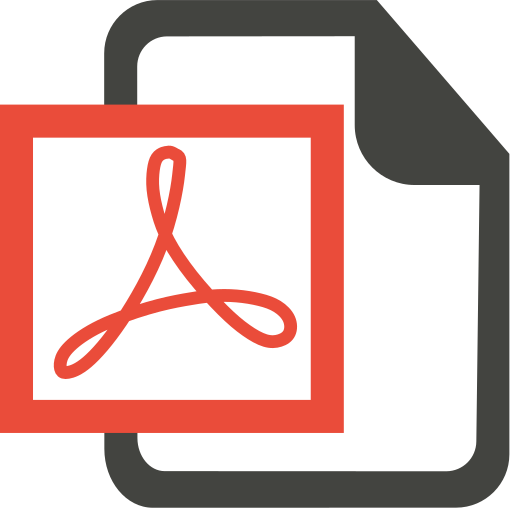Full Episode Audio (download link is to the right of the volume icon)
Listening Comp. Audio (download link is to the right of the volume icon)
Welcome to Lesson #15 of Stress Free German. Let’s start with a quick review of the locational forms we worked with in the previous lesson. So, first say…
We have a balcony.
Wir haben einen Balkon.
We’re on the balcony.
Wir sind auf dem Balkon.
This is a big shelf.
Das ist ein großes Regal.
The present is on the shelf.
Das Geschenk ist auf dem Regal.
Ask your boss: Do you have the newspaper?
Haben Sie die Zeitung?
You glasses, sir, are on the newspaper.
Ihre Brille ist auf der Zeitung.
Ok. That’s all we need for review. Now let’s look at our new image for today. So, inside some place we see the following masculine nouns: A wardrobe, which is a free-standing cabinet for one’s clothes. On the wall to the left is a mirror. Between the wardrobe and the mirror is a chair which reminds us these elements are all masculine. And the floor here is interesting. It’s made of long thin planks of wood. And finally, on the floor is a beautiful rug. So the four elements here are wardrobe, mirror, rug, floor. Here are the first two…
Schrank und Spiegel
Now, we already know the word Kühlschrank…literally, a cool closet. So Schrank itself shouldn’t be too hard. How about this word: Spiegel
To me, there’s a kind of distant relation to the English word spectacles. In English, spectacles are pieces of glass you look through to see something. In German, Der Spiegel is also a piece of glass you look at to see yourself.
In a furniture store, tell the salesperson: We are looking for a wardrobe.
Wir suchen einen Schrank.
Ask: Where is the mirror?
Wo ist der Spiegel?
And the other two masculine elements in our image were rug and floor.
Teppich, Boden
Again, it helps to look at the origin of words. Clearly, Teppich is related to the word tapestry, which is a heavy cloth that has designs woven into it. One more time: A rug is a tapestry. And a tapestry gives us…. Teppich
Finally we heard Boden. And once again, it helps to be flexible, and look at the word’s origin. Boden is related to the English word bottom…the lower part of something….which is what a floor is, right? Though we need to be aware that Boden just as often refers to the ground itself, rather than the floor of a room.
Boden
In a moment I’ll prompt you to recall the words mirror, rug and floor. But we’re going to do it in steps, and we’re going to of course see each object in our mind as we say it. So…
Mirror….is related to spectacles…Spiegel
Next: Rug is related to…tapestry….Teppich
Floor is related to….bottom….Boden.
Tell your friend: I love your rug.
Ich liebe deinen Teppich.
The floor is very cold.
Der Boden ist sehr kalt.
(MUSIC)
Who’s up for a new verb? (SFX: cheers) Glad to hear it. So imagine you’re in Heidelberg, looking for your friend’s apartment. You call him and say you’re having trouble finding it. He tells you to look for him, and adds…
Ich stehe auf dem Balkon.
Hmm….You’re looking, but nope. You don’t see anyone standing out on a balcony. So when you tell him that, your hear his door open, his footsteps. Now he tells you…
Jetzt ich stehe auf der Straße.
What image do you see in your mind with that last phrase? You should imagine him standing in the street…perhaps waving his hands so you can spot him. Try that same line:
I’m standing in the street.
Ich stehe auf der Straße.
How about: We are standing on the balcony.
Wir stehen auf dem Balkon.
Ich stehe…wir stehen….What would be the “he/she” form of the verb, do you think? Er steht.
And the informal you form? Du stehst
So try to say: The wardrobe is standing on the floor.
Der Schrank steht auf dem Boden.
Ask a friend: Are you standing on the rug???
Stehst du auf dem Teppich?
Let’s do a quick comparison. So imagine someone’s suitcase inside a wardrobe. How would we say that?
Der Koffer ist im Schrank.
But now imagine it as sitting on top of the wardrobe…it’s almost touching the cieling, right?
Der Koffer ist auf dem Schrank.
We could do that with the suitcase itself. Envision someone’s passport inside a suitcase.
Der Pass ist im Koffer.
Now envision it as being on top of the suitcase. Not in it, but on it.
Der Pass ist auf dem Koffer.
You try it. The dog is in the car.
Der Hund ist im Auto.
Poor thing! It’s dangerous to leave a dog in a car. Right? Inside. But now envision the dog on the roof of the car. Say…
The dog is on the car.
Der Hund ist auf dem Auto.
So good guys. Quick break…
TIP OF THE DAY
These past few lessons we’ve been integrating prepositions into our German speech. So what’s a preposition exactly? In English they’re words like in, on, by, for, and so on. These little words that denote a relationship–often a spatial relationship–between two objects. They’re tiny, but they carry a lot of weight. Think of someone who’s in a hurry, and you accidentally tell him: Your keys are on the desk, when in reality his keys are in the desk.
And prepositions, these little words, usually cause big problems for language learners. It doesn’t matter if you’re learning German, English, Russian…the issue is, languages only have so many of these little words to go around, so they end up being used for a variety of things. Again, look no further than the English word “on.” The book is on the table. Ok. I get that. But then…Why are the lights on? So on also means “operating.” Or when you say, I’m on the train…are you really riding on top of it, with the wind in your hair? No. You actually mean you’re inside it. In fact, I could go on and on about on. The tip here is simple: Try not to affix just one meaning to these tiny words. Learn them slowly, phrase by phrase, just as we’re doing in this course.
Speaking of which, let’s get back to it….Say:
The key is on top of the cupboard.
Der Schlüssel ist auf dem Schrank.
Use that pause button. Be sure to see all of these.
The dog is standing on the rug.
Der Hund steht auf dem Teppich.
The mirror is on the floor.
Der Spiegel ist auf dem Boden.
Or: The mirror is standing on the shelf.
Der Spiegel steht auf dem Regal.
Ask a friend: Are you going to the museum?
Gehst du ins Museum?
We’re going to the movies.
Wir gehen ins Kino.
Ask a friend: Are you going to Copenhagen?
Gehst du nach Kopenhagen?
No. We’re going to Stockholm.
Nein. Wir gehen nach Stockholm.
(MUSIC)
I’m sure you’ve noticed we’re approaching things very methodically here. We’ve been learning verbs and their various conjugations step by step. Prepositions, we’re slowly accumulating, too. And now we turn back to our basic, introductory phrases. For now, let’s just listen in as people in their twenties meet and greet at a conference…
Woher kommst du?
Ich komme aus England.
Woher kommst du?
Ich komme aus Amerika.
We notice first off that they are greeting each other informally. Just follow the native speaker’s lead. If they’re your age and speak to you formally, then of course respond with the formal forms. But if, as in the brief back and forths we just heard, they speak informally. Do as they do. Ask…
Where do you come from?
Woher kommst du?
I come from England
Ich komme aus England.
Where do you come from?
Woher kommst du?
I come from America.
Ich komme aus Amerika.
And where do you live?
Und…wo wohnst du?
I live in New York.
Ich wohne in New York.
I live in Manchester.
Ich wohne in Manchester.
If we’re interacting with someone much older, though…let’s ask formally:
Where do you come from?
Woher kommen Sie?
Try to say: We live in Vienna.
Wir wohnen in Wien.
Listen as Sarah introduces her friend from Russia.
Das ist Sergei. Er kommt aus Russland und wohnt jetzt in Hamburg.
Could you follow that? Here’s another. Hans will introduce Natasha…
Das ist Natasha. Sie kommt aus der Ukraine und wohnt jetzt in München.
Let me prompt you on those.
This is Sergei. He comes from Russia…and lives now in Hamburg.
Das ist Sergei. Er kommt aus Russland und wohnt jetzt in Hamburg.
This is Natasha. She comes from the Ukraine and lives now in Munich.
Das ist Natasha. Sie kommt aus der Ukraine und wohnt jetzt in München.
In English, we should no longer say “the” about Ukraine. We don’t say he comes from The France or the Denmark, after all. But it seems German still uses the article.
How about: My mother lives in Germany.
Meine Mutter wohnt in Deutschland.
Apologies for including so few countries in this part of the lesson. Obviously there are far too many to cover even briefly in a concise lesson.
(MUSIC)
Try to say: What a beautiful rug!
Was für ein schöner Teppich!
The wardrobe is very small.
Der Schrank ist sehr klein.
The mirror is standing on the table.
Der Spiegel steht auf dem Tisch.
Where is my cellphone?
Wo ist mein Handy?
Answer: On the floor.
Auf dem Boden.
We’re standing in the street.
Wir stehen auf der Straße.
How about: We are standing on the balcony.
Wir stehen auf dem Balkon.
Sir, your suitcase is in the wardrobe.
Ihr Koffer ist im Schrank.
Your passport is on the table.
Ihr Pass ist auf dem Tisch.
Great job as always! See you in the next lesson.

Lesson PDF Download – Right click on PDF Icon – Save Link As…
